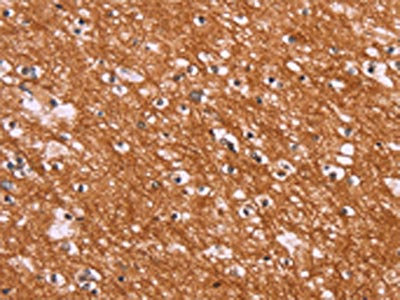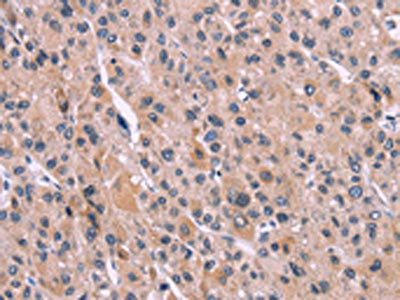ENDOG Antibody
-
货号:CSB-PA055939
-
规格:¥1100
-
图片:
-
The image on the left is immunohistochemistry of paraffin-embedded Human brain tissue using CSB-PA055939(ENDOG Antibody) at dilution 1/15, on the right is treated with synthetic peptide. (Original magnification: ×200)
-
The image on the left is immunohistochemistry of paraffin-embedded Human liver cancer tissue using CSB-PA055939(ENDOG Antibody) at dilution 1/15, on the right is treated with synthetic peptide. (Original magnification: ×200)
-
-
其他:
产品详情
-
Uniprot No.:Q14249
-
基因名:
-
别名:ENDOG antibody; Endonuclease G antibody; mitochondrial antibody; Endo G antibody; EC 3.1.30.- antibody
-
宿主:Rabbit
-
反应种属:Human
-
免疫原:Synthetic peptide of Human ENDOG
-
免疫原种属:Homo sapiens (Human)
-
标记方式:Non-conjugated
-
抗体亚型:IgG
-
纯化方式:Antigen affinity purification
-
浓度:It differs from different batches. Please contact us to confirm it.
-
保存缓冲液:-20°C, pH7.4 PBS, 0.05% NaN3, 40% Glycerol
-
产品提供形式:Liquid
-
应用范围:ELISA,IHC
-
推荐稀释比:
Application Recommended Dilution ELISA 1:1000-1:2000 IHC 1:25-1:100 -
Protocols:
-
储存条件:Upon receipt, store at -20°C or -80°C. Avoid repeated freeze.
-
货期:Basically, we can dispatch the products out in 1-3 working days after receiving your orders. Delivery time maybe differs from different purchasing way or location, please kindly consult your local distributors for specific delivery time.
相关产品
靶点详情
-
功能:Endonuclease that preferentially catalyzes the cleavage of double-stranded 5-hydroxymethylcytosine (5hmC)-modified DNA. The 5hmC-modified nucleotide does not increase the binding affinity, but instead increases the efficiency of cutting and specifies the site of cleavage for the modified DNAs. Shows significantly higher affinity for four-stranded Holliday junction over duplex and single-stranded DNAs. Promotes conservative recombination when the DNA is 5hmC-modified. Promotes autophagy through the suppression of mTOR by its phosphorylation-mediated interaction with YWHAG and its endonuclease activity-mediated DNA damage response. GSK3-beta mediated phosphorylation of ENDOG enhances its interaction with YWHAG, leading to the release of TSC2 and PIK3C3 from YWHAG resulting in mTOR pathway suppression and autophagy initiation. Promotes cleavage of mtDNA in response to oxidative and nitrosative stress, in turn inducing compensatory mtDNA replication.
-
基因功能参考文献:
- These data indicated the participation of EndoG in alternative mRNA splicing of the telomerase catalytic subunit hTERT, regulation of telomerase activity and determination of cell fate. PMID: 28886883
- Galectin-3-induced cell death in HIV-1-infected macrophages is most likely related to the translocation of Endo G from the cytoplasm to the nucleus. PMID: 27981746
- ndoG digests long non-coding RNA and produces 47-mer RNA oligonucleotide complementary to hTERT pre-mRNA exon 8 and intron 8 junction place. Interaction of 47-mer RNA oligonucleotide and hTERT pre-mRNA causes alternative splicing. PMID: 27797329
- Overexpression of EndoG in CD4+ T cells downregulated the expression of the active full-length hTERT variant and upregulated the inactive alternatively spliced variant. PMID: 28320284
- Overexpression of EndoG in capital ES, Cyrillicsmall a, Cyrilliccapital ES, Cyrillicsmall o, Cyrillic-2 cells downregulated the expression of active full-length hTERT variant and upregulated non-active spliced variant. PMID: 27420614
- EndoG is not a mediator of exogenous DNA clearance, but in non-physiological circumstances, it may nonspecifically cleave intracellular DNA regardless of its origin. PMID: 27260396
- These findings suggest that non-viral DNA vectors are also substrates for EndoG in its role in homologous recombination PMID: 27239850
- our study established a link between Endo G and mitochondrial function during cardiac hypertrophy PMID: 26492643
- Results show that BNIP3 interacts with the voltage-dependent anion channel (VDAC) to directly induce mitochondrial release and nuclear translocation of EndoG. PMID: 25436615
- Endonuclease G (EndoG), an apoptotic nuclease, as an essential factor for MLLbcr-specific DNA recombination after induction of replication stress. PMID: 25132265
- Ethyl gallate induces apoptosis of HL-60 cells by promoting the expression of caspases-8, -9, -3, apoptosis-inducing factor and endonuclease G. PMID: 23109891
- Data suggest that endonuclease G (EndoG) inhibitors have the potential to be utilized for amelioration of cell injuries in which participation of EndoG is essential. PMID: 25401220
- study demonstrate EndoG interacts with cellular Inhibitor of Apoptosis Protein 1 (cIAP1); results indicate IAPs interact and ubiquitinate EndoG via K63-mediated isopeptide linkages without affecting EndoG levels and EndoG-mediated cell death, suggesting EndoG ubiquitination by IAPs may serve as a regulatory signal independent of proteasomal degradation PMID: 25139236
- Using gene reporter assays, we show that promoter variations in 11 intrinsic apoptosis genes, including ADPRT, APAF1, BCL2, BAD, BID, MCL1, BIRC4, BCL2L1, ENDOG, YWHAB, and YWHAQ, influence promoter activity in an allele-specific manner. PMID: 24038028
- Data indicate that older muscles showed a 3-fold greater fraction of endonuclease G (a mitochondrial proapoptotic factor)-positive myonuclei. PMID: 24371120
- CHIP overexpression reduces EndoG levels, and results in reduced or no oxidative stress-induced cell death in cultured cancer cells. PMID: 23764847
- Endonuclease G mediates alpha-synuclein cytotoxicity during Parkinson's disease. PMID: 24129513
- These data indicate that HSV-1 UL12.5 deploys cellular proteins, including ENDOG and EXOG, to destroy mtDNA and contribute to a growing body of literature highlighting roles for ENDOG and EXOG in mtDNA maintenance. PMID: 23986585
- Conclude that EndoG and TOPO2a may actively participate in apoptotic chromatin degradation. PMID: 22160858
- Benzyl isothiocyanate induces apoptosis in DU 145 cells through the release of AIF and Endo G from the mitochondria and also promotes caspase-3 activation. PMID: 21206973
- ENDOG might contribute to cancer pathogenesis by expressional alterations, but not by somatic mutations PMID: 21080888
- When EndoG gene expression was downregulated by lentiviral shRNA vectors, we found a significant reduction in the replicative life span and a corresponding increase in cell death. PMID: 20211237
- nuclear translocation of apoptosis-inducing factor and endonuclease G play a crucial role in (-)-Epigallocatechin-3-gallate -induced apoptosis of human laryngeal epidermoid carcinoma Hep2 cells PMID: 19781850
- examination of submitochondrial localization and its ability to cleave R-loops in order to clarify role in mtDNA replication PMID: 12444964
- endonuclease G and apoptosis-inducing factor are relocated and have roles in calcium induced signaling and oxidative stress-related impairment of mitochondria PMID: 15182854
- EndoG forms complexes with AIF and FEN-1 but not with PCNA. Heat shock proteins 70 interact with EndoG and are involved in the regulation of its activity. PMID: 16133872
- Our findings suggest that the presence of EndoG in non-invasive breast cancer cells determines their sensitivity to apoptosis, which may be taken into consideration for developing the chemotherapeutic strategy for cancer treatment. PMID: 17046751
- Hypochlorous acid induced Bax-dependent mitochondrial permeability which led to cell death without caspase activity by processes involving AIF/EndoG-dependent pathways. PMID: 17107772
- study of cellular localization of the endonuclease G, AIF & AMID during apoptosis using bioinformatics and image analysis PMID: 17347867
- EndoG inactivation by loss of expression may not occur in colorectal and gastric cancers. Rather, neo-expression of EndoG may play a role in both colorectal and gastric tumorigenesis. PMID: 18705403
- data showed that loss of EndoG expression is a feature of hepatocellular carcinomas PMID: 18754329
- These results suggest that Bim, Bcl-xL, FAK and endonuclease G are involved in safingol-induced apoptosis of detached oral squamous cell carcinoma. PMID: 19199036
- Results suggest that human Endonuclease G shares a similar catalytic mechanism with nuclease A from Anabaena. PMID: 19272175
显示更多
收起更多
-
亚细胞定位:Mitochondrion.
-
蛋白家族:DNA/RNA non-specific endonuclease family
-
数据库链接:
HGNC: 3346
OMIM: 600440
KEGG: hsa:2021
STRING: 9606.ENSP00000361725
UniGene: Hs.745161
Most popular with customers
-
-
YWHAB Recombinant Monoclonal Antibody
Applications: ELISA, WB, IF, FC
Species Reactivity: Human, Mouse, Rat
-
Phospho-YAP1 (S127) Recombinant Monoclonal Antibody
Applications: ELISA, WB, IHC
Species Reactivity: Human
-
-
-
-
-






















